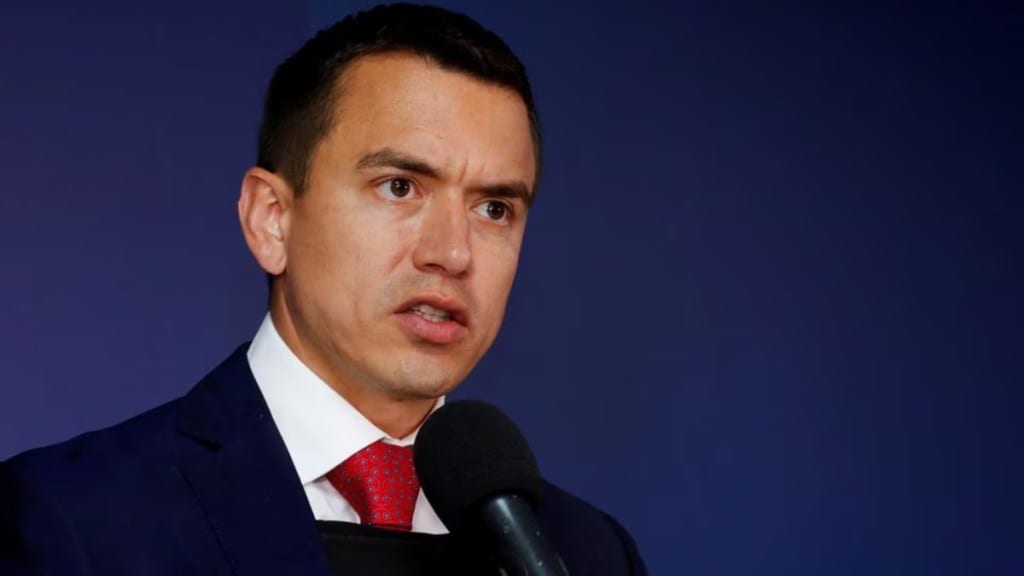Amid a surge of unprecedented violence, which tragically claimed the life of a candidate, Ecuador has ushered in a new president in the form of Daniel Noboa.
The 35-year-old is the heir to a fortune amassed through the banana trade, marking a significant shift in the nation’s leadership. His ascent to power takes place against a backdrop of escalating drug trafficking-related violence that has left Ecuadorians anxious, constantly vigilant, and reluctant to venture beyond the safety of their homes.
Based on various factors in the public domain, the election results, with over 97 percent of the votes counted, have handed Daniel Noboa a slim victory with 52.1 percent compared to his rival Luisa González’s 47.9 percent. González, a leftist lawyer and ally of the exiled former President Rafael Correa, gracefully conceded defeat, urging Noboa to deliver on the promises of his campaign. In response, Noboa expressed gratitude to the Ecuadorian people for placing their faith in his “new political project, a young political project, an improbable political project.”
Tenure of the New President
Noboa’s presidency will be brief, running until May 2025, due to President Guillermo Lasso’s early departure following the dissolution of the National Assembly. Lasso’s term was marred by turmoil, as lawmakers pursued impeachment proceedings against him over alleged improprieties in a state-owned company’s contract. In this climate of instability, Ecuadorians, regardless of age, social status, or location, share a common demand: safety. However, addressing the enormity of the security crisis within the constraints of such a short presidential term remains a formidable challenge.
Difficult Road ahead
Noboa, educated in the United States, faces an uphill battle, as it will be a big challenge for the new leader to reverse Ecuador’s security crisis within 18 months, given the complex and deeply rooted issues.
The violence that has gripped Ecuador for the past three years is primarily linked to the surge in criminal activity related to cocaine trafficking. According to various reports in the public domain, the government’s inability to effectively combat this issue was starkly revealed by the assassination of presidential candidate Fernando Villavicencio, a prominent anti-corruption activist. Since then, numerous politicians and leaders have fallen victim to violence, car bombings have rocked several cities, and prison riots have escalated.
About the new Ecuadorian President
Noboa’s foray into politics commenced in 2021 when he secured a seat in the National Assembly and assumed the chair of its Economic Development Commission. This US-educated businessman had a background in event organizing, having established his company at the age of 18, before joining his father’s conglomerate, the Noboa Corp. His father, Álvaro Noboa, is Ecuador’s wealthiest individual, with a conglomerate that originated in banana cultivation, Ecuador’s primary crop. It has since expanded to encompass more than 128 companies in numerous countries. Despite several unsuccessful presidential bids, the elder Noboa remains an influential figure.
Challenges ahead
The challenge ahead for the younger Noboa is formidable. His party does not hold enough seats in the National Assembly to govern independently, making it imperative to garner support from opposing lawmakers to avert the legislative gridlock that characterized Lasso’s term. Lasso, a conservative former banker, clashed repeatedly with lawmakers during his tenure, which contributed to his decision not to seek re-election.
During Lasso’s presidency, violent deaths surged, reaching a historic high of 4,600 in 2022, which was double the total in 2021. In the first half of 2023, the National Police recorded 3,568 violent deaths. The spike in violence can be traced back to the trafficking of cocaine produced in neighbouring Colombia and Peru. Mexican, Colombian, and Balkan cartels have established a presence in Ecuador, collaborating with local criminal gangs.
About Luisa González
Luisa González, Noboa’s opponent in the election, was relatively unknown to the majority of voters until she was selected as the presidential candidate by the party of her mentor, former President Correa. She held various government positions during Correa’s decade-long presidency and served as a lawmaker until May.
More about the New Leader
With his presidency limited to a mere 17 months, Daniel Noboa faces the formidable task of combating the escalating gang violence that has gripped Ecuador in recent years. His campaign was overshadowed by the August assassination of candidate Fernando Villavicencio, a relentless crusader against corruption. Violent crime rates have surged, and Ecuador has become a hub for drug cartels due to its strategic location between the world’s top two cocaine producers, Colombia and Peru.
Noboa has proposed innovative strategies to address these challenges. He suggests relocating the most hardened criminals to prison ships off the Ecuadorian coast to dismantle the prison gangs responsible for deadly violence. Moreover, he aims to enhance security at Ecuador’s borders and ports to disrupt key drug-trafficking routes, including the installation of scanners to intercept more shipments of cocaine.
Results
In the recent presidential runoff, the National Electoral Council (CNE) reported that Daniel Noboa secured 52.29 percent of the valid votes, while his rival Luisa Gonzalez garnered 47.71 percent of the votes. This outcome marks the beginning of a critical chapter in Ecuador’s history, as the nation grapples with the daunting task of restoring security and peace to its citizens. Noboa’s ascendancy is fraught with challenges, and his success in addressing Ecuador’s deep-seated security crisis remains uncertain. Only time will tell if this young and untested leader can rise to the occasion and steer the nation toward a safer and more prosperous future.


